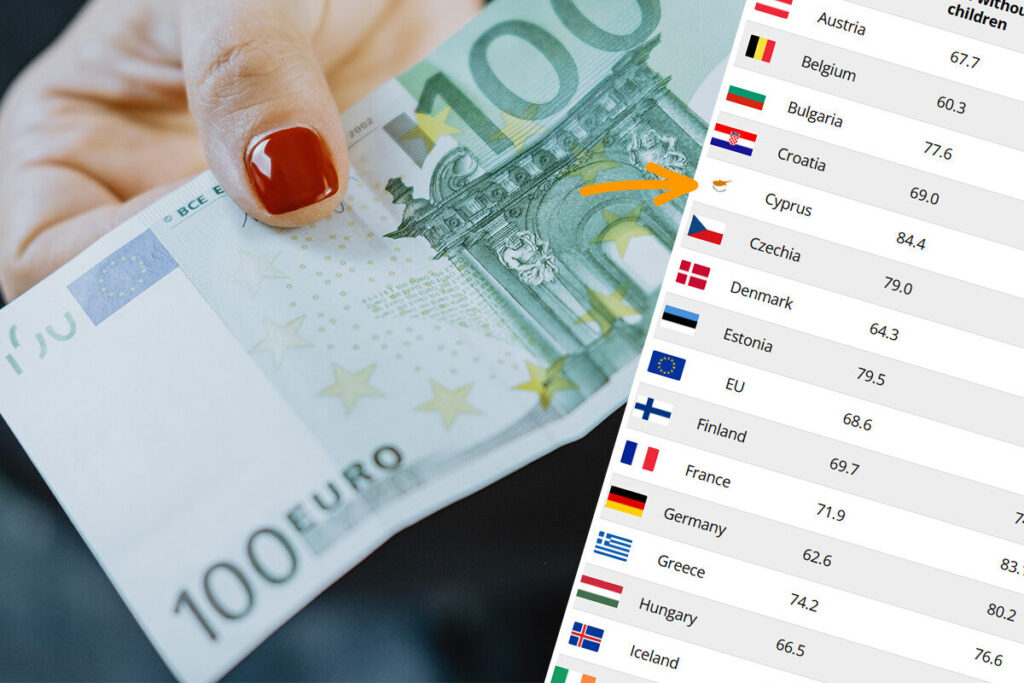A recent Euronews report highlights Cyprus’s leading position in the European Union regarding net salary retention. This means that Cypriot workers retain a higher percentage of their gross income after taxes and social contributions compared to their EU counterparts.
| Country | Single without children (%) |
One-earner couple with two children (%) |
Two-earner couple with two children (%) |
|---|---|---|---|
| Austria | 67.7 | 85.9 | 76.0 |
| Belgium | 60.3 | 80.1 | 65.8 |
| Bulgaria | 77.6 | 86.6 | 81.9 |
| Croatia | 69.0 | 80.0 | 73.8 |
| Cyprus | 84.4 | 88.7 | 85.8 |
| Czechia | 79.0 | 92.3 | 82.4 |
| Denmark | 64.3 | 73.7 | 67.2 |
| Estonia | 79.5 | 87.5 | 83.5 |
| EU | 68.6 | 82.6 | 73.6 |
| Finland | 69.7 | 74.3 | 72.0 |
| France | 71.9 | 83.1 | 75.9 |
| Germany | 62.6 | 80.2 | 68.2 |
| Greece | 74.2 | 76.6 | 74.2 |
| Hungary | 66.5 | 76.2 | 71.3 |
| Iceland | 72.8 | 85.8 | 73.6 |
| Ireland | 72.0 | 85.8 | 74.6 |
| Italy | 69.6 | 85.1 | 76.5 |
| Latvia | 72.1 | 84.0 | 78.1 |
| Lithuania | 61.8 | 76.0 | 66.2 |
| Luxembourg | 67.9 | 90.3 | 74.3 |
| Malta | 74.9 | 85.9 | 78.7 |
| Netherlands | 72.8 | 81.7 | 77.1 |
| Norway | 71.9 | 76.7 | 74.3 |
| Poland | 75.9 | 102.5 | 87.3 |
| Portugal | 75.0 | 90.2 | 78.3 |
| Romania | 63.1 | 70.4 | 66.7 |
| Slovakia | 75.9 | 107.1 | 88.9 |
| Slovenia | 64.4 | 78.8 | 68.8 |
| Spain | 77.5 | 83.4 | 79.0 |
| Sweden | 76.9 | 82.8 | 79.9 |
| Switzerland | 82.0 | 94.7 | 85.5 |
| Turkey | 71.6 | 71.6 | 71.6 |
Source: Eurostat – Ratio of annual net average earnings to gross average earnings (2024)
Understanding Net Salary Retention
Net salary retention refers to the portion of an employee’s gross income that remains after mandatory deductions, such as income tax and social security contributions. A higher retention rate indicates that workers take home more of their earnings, enhancing their purchasing power and financial well-being.
Cyprus’s Position in the EU
According to the data presented:
- Cyprus: Workers retain approximately 85.9% of their gross income.
- EU Average: The average net salary retention across the EU is 68.8%.
This positions Cyprus at the top among EU countries, indicating a more favorable tax and social contribution structure for employees.
Implications for the Real Estate Market
Higher net incomes can significantly impact the real estate sector:
- Increased Purchasing Power: With more disposable income, individuals are better positioned to invest in property, whether for personal use or as an investment.
- Attracting Foreign Investors: A favorable tax environment can draw foreign professionals and investors seeking to maximize their earnings and investments.
- Stimulating Market Growth: Enhanced financial capacity among residents can lead to increased demand for housing, driving growth in the real estate market.
Conclusion
Cyprus’s leading position in net salary retention underscores its economic competitiveness within the EU. For real estate professionals and investors, this translates to a market ripe with opportunities, driven by residents’ enhanced purchasing power and the country’s appeal to foreign investors.
Source: Euronews
For more insights into Cyprus’s economic landscape and its impact on real estate, stay tuned to our blog.

